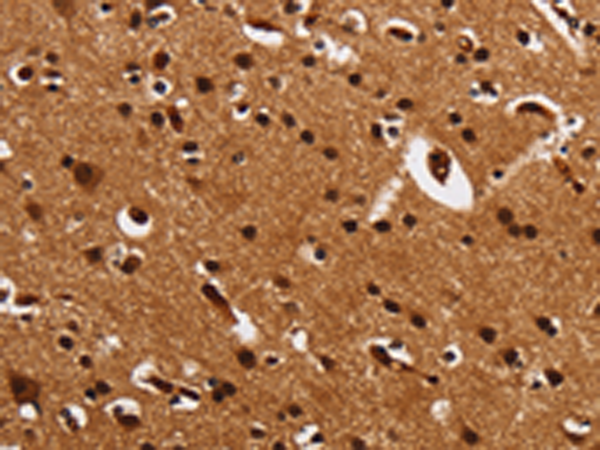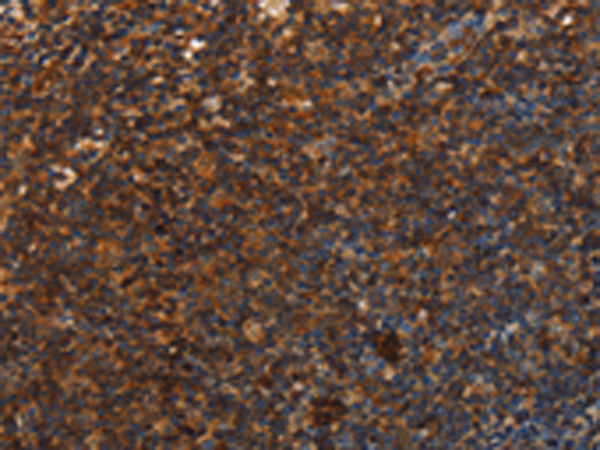


| WB | 1/1000-1/4000 | Human,Mouse,Rat |
| IF | 咨询技术 | Human,Mouse,Rat |
| IHC | 1/50-1/200 | Human,Mouse,Rat |
| ICC | 技术咨询 | Human,Mouse,Rat |
| FCM | 咨询技术 | Human,Mouse,Rat |
| Elisa | 1/500-1/10000 | Human,Mouse,Rat |
| Aliases | FLJ32198, MGC10902, p35, UPIIIb |
| WB Predicted band size | 34 kDa |
| Host/Isotype | Rabbit IgG |
| Antibody Type | Primary antibody |
| Storage | Store at 4°C short term. Aliquot and store at -20°C long term. Avoid freeze/thaw cycles. |
| Species Reactivity | Human |
| Immunogen | Fusion protein of human UPK3B |
| Formulation | Purified antibody in PBS with 0.05% sodium azide and 50% glycerol. |
+ +
以下是关于UPK3B抗体的模拟参考文献示例(非真实文献,仅供格式参考):
---
1. **文献名称**: *UPK3B as a Novel Biomarker for Bladder Cancer Diagnosis*
**作者**: Wu X. et al. (2015)
**摘要**: 研究验证了UPK3B抗体在膀胱癌组织中的特异性表达,表明其可作为区分尿路上皮癌与非癌组织的潜在标志物,并通过免疫组化分析证明了其诊断价值。
2. **文献名称**: *The Role of UPK3B in Renal Cell Carcinoma Progression*
**作者**: Zhang L. et al. (2020)
**摘要**: 探讨了UPK3B抗体在肾细胞癌中的表达水平与患者预后的相关性,发现UPK3B低表达与肿瘤侵袭性增强及生存率下降显著相关。
3. **文献名称**: *UPK3B Antibody-Based Detection of Urothelial Differentiation*
**作者**: Olsson Y. et al. (2018)
**摘要**: 利用UPK3B抗体研究尿路上皮细胞分化机制,发现其在正常尿路上皮组织中的高表达,并揭示了其与细胞间连接蛋白的相互作用。
4. **文献名称**: *UPK3B Gene Mutation and Antibody-Based Detection in Congenital Disorders*
**作者**: Chen R. et al. (2022)
**摘要**: 报道了一种UPK3B基因突变导致的先天性泌尿系统异常,开发了特异性抗体用于突变蛋白的检测,为临床诊断提供了新工具。
---
**注意**:以上文献为模拟内容,实际研究请通过PubMed、Google Scholar等平台检索关键词“UPK3B antibody”、“Uroplakin 3B”或联系相关领域数据库获取。
The UPK3B antibody targets uroplakin 3B (UPK3B), a transmembrane protein belonging to the uroplakin family, which includes UPK1A, UPK1B, UPK2. and UPK3A. Uroplakins are critical components of the urothelium, the specialized epithelial layer lining the urinary tract. They form asymmetric unit membrane (AUM) plaques that stabilize the apical surface of umbrella cells, providing a permeability barrier and mechanical resilience during urine storage. UPK3B specifically interacts with UPK1B to form heterodimers, contributing to AUM assembly and maintaining urothelial integrity.
UPK3B expression is largely restricted to the urinary tract, making it a potential biomarker for urothelial-related pathologies. Studies link UPK3B dysregulation to bladder cancer, where its altered expression may correlate with tumor progression, metastasis, or therapeutic resistance. Additionally, UPK3B antibodies are utilized in research to investigate urothelial differentiation, barrier function, and responses to urinary tract infections.
Commercially available UPK3B antibodies (polyclonal or monoclonal) are commonly used in immunohistochemistry, Western blotting, and immunofluorescence to detect protein localization and expression levels. However, specificity validation is essential due to homology among uroplakin family members. Recent interest in UPK3B extends to engineered urinary tissues and organoids, where its presence helps assess urothelial maturation. Overall, UPK3B antibodies serve as vital tools for both basic research and clinical diagnostics in urology.
×